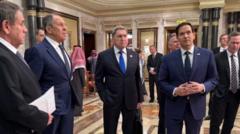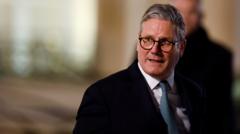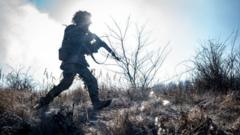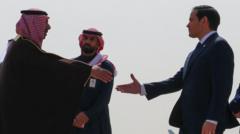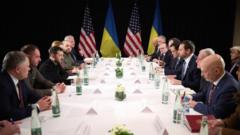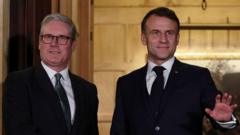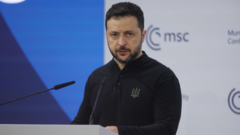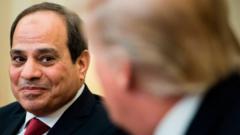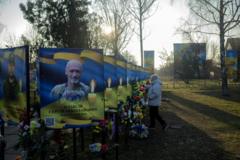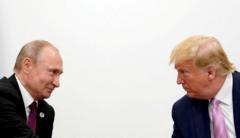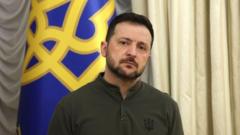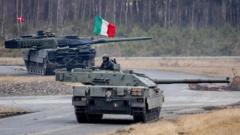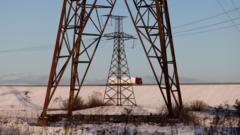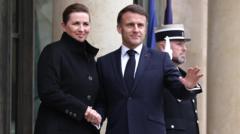Kosovo's ruling party Vetevendosje is projected to secure about 42% of the vote in the latest parliamentary elections, but an exit poll suggests this would not be enough for a parliamentary majority, raising questions about coalition possibilities and future governance.
Kosovo's Ruling Party Maintains Lead but Lacks Majority, Exit Poll Indicates

Kosovo's Ruling Party Maintains Lead but Lacks Majority, Exit Poll Indicates
Kosovo's recent parliamentary elections show Prime Minister Albin Kurti's party receiving significant backing yet potentially missing the crucial majority needed in parliament.
Kosovo's parliamentary elections indicate that Prime Minister Albin Kurti's Vetevendosje party is poised to win approximately 42% of the votes, translating to around 47 seats in the 120-seat Assembly, according to an exit poll released by Koha News. Despite leading the results, the party will fall short of a majority in parliament. The Democratic Party of Kosovo (PDK) is projected to receive about 21% of the votes, closely followed by the Democratic League of Kosovo (LDK) at 20% and the Alliance for the Future of Kosovo (AAK) at 7%.
Kurti's party, which entered power in 2021 as part of a coalition that garnered over 50% of the vote, has seen a rise in popularity, particularly due to his assertive policies aimed at enhancing governmental authority across northern regions predominantly inhabited by ethnic Serbs. These measures, however, have strained relations with key international allies, namely the EU and the United States. In contrast, opposition factions have advocated for more diplomatic approaches and criticized the current government's economic management.
Among the opposition, LDK is campaigning for NATO membership and seeks to mend ties with the US, while PDK, rooted in Kosovo Liberation Army history, is a notable center-right party. According to Kosovo's constitution, at least 10 representatives in parliament must come from the Serb minority, and given the current political climate, cooperation between Kurti's party and these representatives seems unlikely.
Additionally, the remaining 10 parliamentary seats are designated for other minority ethnic groups, which have historically aligned with Vetevendosje. Kurti, however, has expressed a firm stance against partnering with opposition entities to form a coalition government.
Kosovo declared independence from Serbia in February 2008, following a protracted period of tension between ethnic Serbs and the largely Albanian population. While Kosovo's independence has been acknowledged by the US and most major EU states, Serbia—backed by Russia—continues to reject it, a sentiment echoed by many ethnic Serbs residing within Kosovo.
Kurti's party, which entered power in 2021 as part of a coalition that garnered over 50% of the vote, has seen a rise in popularity, particularly due to his assertive policies aimed at enhancing governmental authority across northern regions predominantly inhabited by ethnic Serbs. These measures, however, have strained relations with key international allies, namely the EU and the United States. In contrast, opposition factions have advocated for more diplomatic approaches and criticized the current government's economic management.
Among the opposition, LDK is campaigning for NATO membership and seeks to mend ties with the US, while PDK, rooted in Kosovo Liberation Army history, is a notable center-right party. According to Kosovo's constitution, at least 10 representatives in parliament must come from the Serb minority, and given the current political climate, cooperation between Kurti's party and these representatives seems unlikely.
Additionally, the remaining 10 parliamentary seats are designated for other minority ethnic groups, which have historically aligned with Vetevendosje. Kurti, however, has expressed a firm stance against partnering with opposition entities to form a coalition government.
Kosovo declared independence from Serbia in February 2008, following a protracted period of tension between ethnic Serbs and the largely Albanian population. While Kosovo's independence has been acknowledged by the US and most major EU states, Serbia—backed by Russia—continues to reject it, a sentiment echoed by many ethnic Serbs residing within Kosovo.

